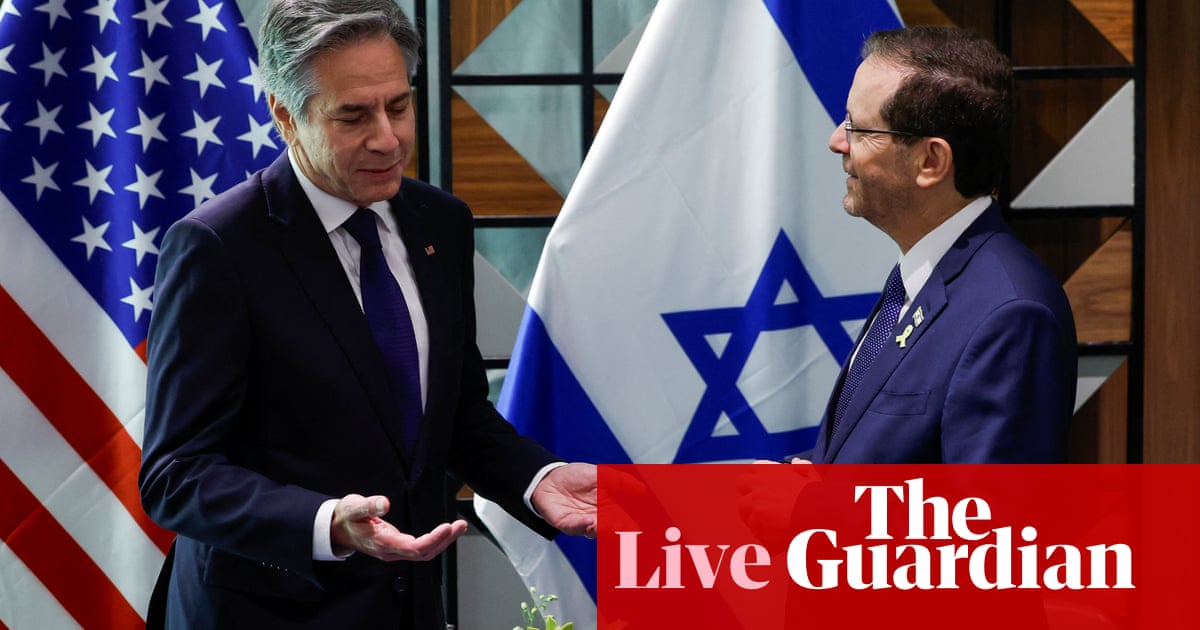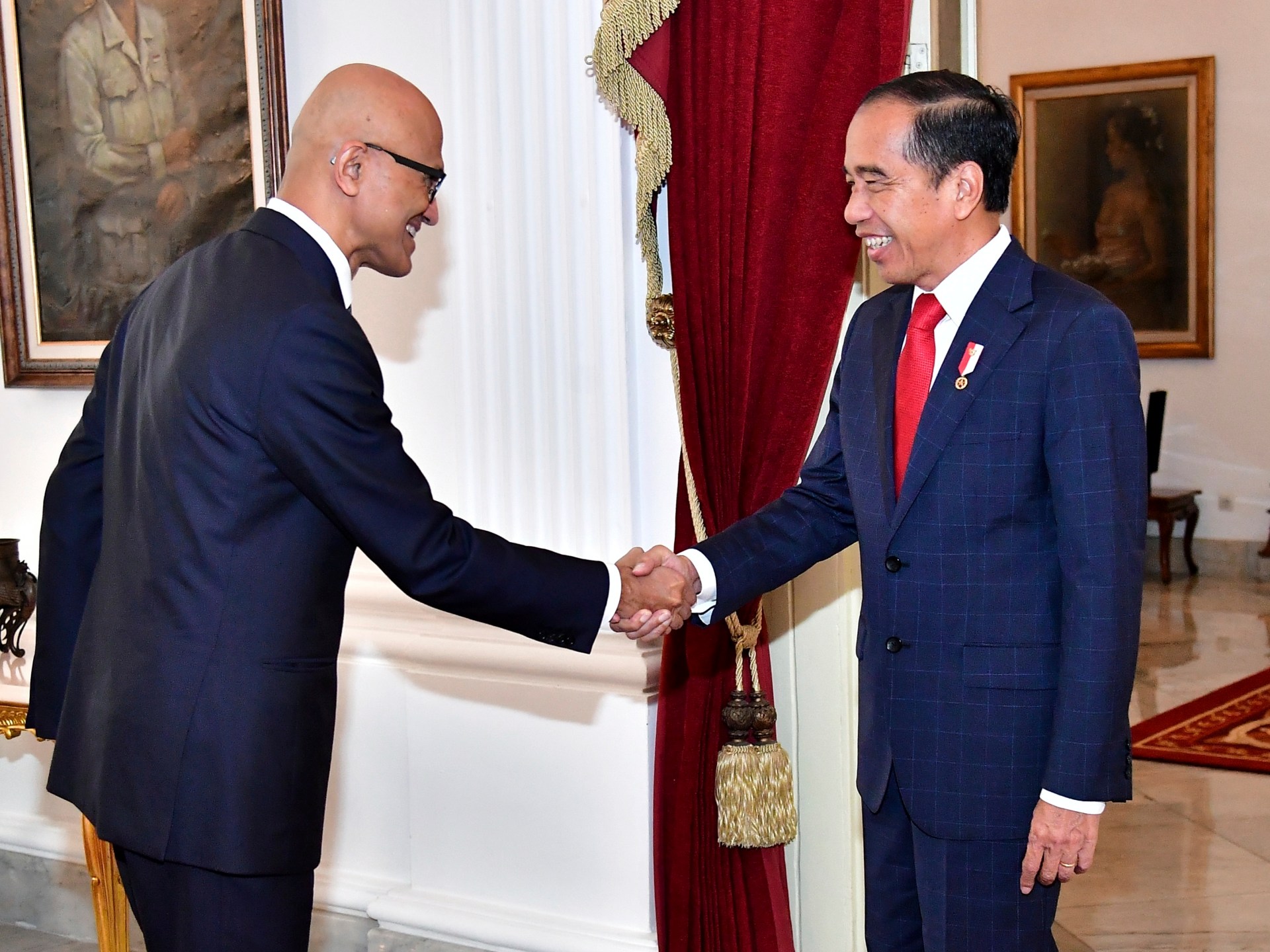David Cameron: lights are ‘flashing red’ on the global dashboard
The “lights are absolutely flashing red” on the global dashboard, the UK’s foreign secretary, David Cameron, warned as he said it was hard to think of a time when there had been so much danger and volatility in the world.
Asked by Sky News if ministers had considered that the strikes on the Houthis could raise the likelihood of terrorist action in the UK, Cameron replied:
The threat level is set after careful consideration by the joint terrorist assessment centre and that is the right way of doing it, it is not in the power of politicians just to suddenly wake up one morning and change the threat level.
Our view is look, take a step back from this, it is hard to think of a time when there has been so much danger and insecurity and instability in the world.
The lights are absolutely flashing red as it were on the global dashboard and what we need at that time is strong leadership and a clear plan, that is what we have with the prime minister and the team in place.
And taking action, if you don’t act against the Houthis is the Red Sea, you are going to see more attacks, they are effectively terroristic attacks, you will see more of that.
Key events
Egypt and China are closely following developments in the Red Sea, focusing on the priority of ensuring the safety and security of navigation, they said in a joint statement on Sunday.
The two countries expressed concern over the expansion of the conflict in the region, stressing the importance of uniting efforts to stop attacks on Gaza, the statement added, according to Reuters.
It comes after Turkey last week claimed the US and UK were intent on turning the Red Sea into a bloodbath, as countries across the Middle East and Europe voiced fears that US-UK strikes against Yemen may destabilise the region and lead to a wider escalation.
Here is the video of the UK’s foreign secretary, David Cameron, warning that the “lights are absolutely flashing red” on the global dashboard (see earlier post at 09.05 for his full comments):
In the UK, Keir Starmer, the Labour leader, has watered down promises to introduce a law giving MPs a vote before military intervention and to stop selling weapons to Saudi Arabia, PA Media reports.
When running to succeed Jeremy Corbyn as party leader in 2020, Starmer promised a “Prevention of Military Intervention Act” under commitments to prevent “more illegal wars”.
He said at the time that he would “pass legislation” to say “military action” could only be taken if a lawful case was made, there was a viable objective and consent from the House of Commons had been given.
But his swift backing of the RAF strikes in Yemen in a bombing raid with the US that the UK prime minister, Rishi Sunak, authorised without consulting parliament, raised questions about the pledge.
Starmer told BBC One’s Sunday With Laura Kuenssberg programme:
There’s no inconsistency here. There is obviously a huge distinction between an operation, the like of which we have seen in the last few days, and military action, a sustained campaign, military action usually involving troops on the ground.
He argued that his proposed change to give the Commons a say only related to sending in ground forces, adding that he stood by that “in principle, absolutely”.
The Labour leader insisted he still wanted to bring in the change but now hinted the alteration may not need to be in law.
“I want to codify that – it could be by a law, it could be by some other means,” he said, adding: “I’m not ruling out law.”
Death toll in Gaza reaches 23,968, says health ministry
A total of 23,968 Palestinians have been killed and a further 60,582 injured by Israeli strikes on Gaza since 7 October, the Gaza health ministry said on Sunday as the war reached its 100th day.
In the past 24 hours, 125 Palestinians were killed and 265 were injured, the ministry added.
Relatives of Arab-Israeli lawmaker killed in Gaza
Arab-Israeli lawmaker Ahmad Tibi has said on social media that three of his relatives had been killed in a strike on Nuseirat refugee camp in central Gaza.
The three people who were killed were named as: Dr Sahar Tibi, an education lecturer, Faisal Tibi, a computer science student and Ahmed Tibi, a 10-year-old boy.
“May Allah have mercy on them. We love life if we can find a way to it,” he wrote on X.
عليهم رحمة الله. نحب الحياة اذا ما استطعنا اليها سبيلاً
יהי זכרם ברוך.אנו נאהב את החיים אם נמצא דרך אליהםWe love life if we can find a way to it
Allah yerhamhom RIP https://t.co/aui5ZyjRu0
— Ahmad Tibi (@Ahmad_tibi) January 14, 2024
Tibi is the leader of the Arab nationalist party Ta’al, which advocates for the rights of Israel’s Arab minority.
Telecommunications have been partly restored in southern Gaza, an AFP reporter in Rafah said, after operator Paltel reported a complete outage on Friday.
Paltel said an Israeli strike killed two of its employees in Khan Younis while they were repairing the network.
Israel’s budget deficit ceiling is expected to rise to 6.6% of gross domestic product in 2024 from 2.25%, according to an amended 2024 budget draft.
Ministers will begin debate on a revised budget later today that will include steep spending to finance the war, with a vote expected by Monday morning, Reuters reports.
Ahmed Bayram, a media and communications adviser for the Norwegian Refugee Council (NRC), which has operated in Gaza for the past 16 years, has spoken to Al Jazeera.
He said:
They’ve experienced loss, grief, displacement and of course fear. Their children cannot have a full night of sleep, fresh food, or clean water for 100 days now.
This very dark moment reminds us that Gaza has been made unlivable for military reasons and all civilians are paying the price. Sadly, we are saying the same thing repeatedly: ‘Stop the bloodshed now.’
The NRC says it operates across 40 countries with specialisms in food security, education, shelter, legal assistance, protection from violence, and water, sanitation and hygiene.
David Cameron has denied that the UK’s strikes on the Houthis were an escalation.
Asked if the UK and US had escalated the situation by the BBC’s Sunday with Laura Kuenssberg, the UK’s foreign secretary said:
No. The escalation has been caused by the Houthis. I mean the point is since 19 November, you have had these 26 attacks.
There have been more of them, they have been getting worse, and you know, not acting is also a policy, it is a policy that doesn’t work.
David Cameron: lights are ‘flashing red’ on the global dashboard
The “lights are absolutely flashing red” on the global dashboard, the UK’s foreign secretary, David Cameron, warned as he said it was hard to think of a time when there had been so much danger and volatility in the world.
Asked by Sky News if ministers had considered that the strikes on the Houthis could raise the likelihood of terrorist action in the UK, Cameron replied:
The threat level is set after careful consideration by the joint terrorist assessment centre and that is the right way of doing it, it is not in the power of politicians just to suddenly wake up one morning and change the threat level.
Our view is look, take a step back from this, it is hard to think of a time when there has been so much danger and insecurity and instability in the world.
The lights are absolutely flashing red as it were on the global dashboard and what we need at that time is strong leadership and a clear plan, that is what we have with the prime minister and the team in place.
And taking action, if you don’t act against the Houthis is the Red Sea, you are going to see more attacks, they are effectively terroristic attacks, you will see more of that.
The UK’s foreign secretary, David Cameron, said he did not agree with Turkey’s president that US-UK strikes on the Houthis were disproportionate.
Asked about Recep Tayyip Erdoğan’s criticism by Sky News’s Sunday Morning With Trevor Phillips, he said:
We don’t agree with what President Erdoğan has said. If you look at the action we have taken, it is actually backed by a very wide coalition of countries.
He is an important Nato ally but in this case we don’t agree. We see this as completely separate from the Israel-Gaza conflict.
Erdoğan said last week that the Houthis in Yemen were mounting a “successful defence” against the US and the UK after they launched air and missile strikes in Houthi-controlled areas of Yemen in what they said was an effort to halt attacks on ships in the Red Sea. Turkey’s president said Britain was trying to turn the Red Sea into a “sea of blood”.
Israeli forces have killed at least nine Palestinian militants during operations in the Gaza Strip, the military said on Sunday.
The fighting, it said, took place in the southern Gaza city of Khan Younis, as well as areas farther north where Israel says it has dismantled much of Hamas’s military capabilities.
These claims are yet to be independently verified.


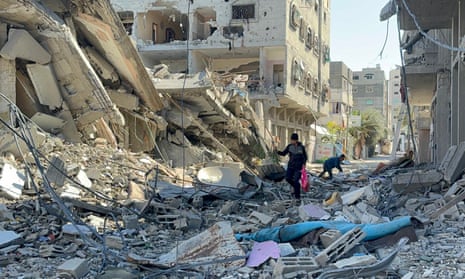
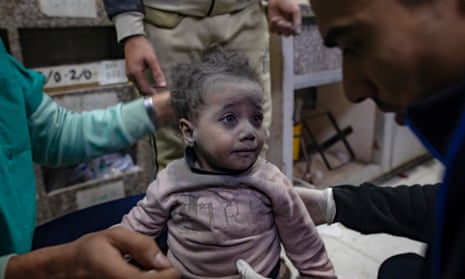

UK ready to strike Houthis again if attacks in Red Sea continue, David Cameron suggests
Britain could strike Houthi targets in Yemen again if the rebel group continues to attack ships in the Red Sea, the UK’s foreign secretary, David Cameron, has indicated.
The former Conservative prime minister warned that the Iran-linked militants could force up prices in Britain if they are allowed to block the passage of container ships in the busy trade route.
The US hit another site in Yemen early on Saturday after the Houthis vowed revenge for the bombing raid carried out by the Americans and the RAF a day earlier.
Writing in the Sunday Telegraph, Lord Cameron said the airstrikes “sent an unambiguous message” to the Houthis that “we are determined to put a stop” to their attacks in the Red Sea.
And he hinted that Britain could join the US in striking the Houthis again if they continued.
“We will work with allies. We will always defend the freedom of navigation. And, crucially, we will be prepared to back words with actions,” Cameron said.
The Houthis say they are attacking only Israeli-linked ships in an attempt to force Israel to lift the siege on Gaza, but the secretary general of the International Maritime Organization, Arsenio Dominguez, told the UN last week the Houthis were not confining their attacks to shipping linked to Israel.
Israeli soldiers exchanged fire with militants attempting to cross from Lebanon into Israel and killed four of them, the Israeli military has said, according to Reuters.
The soldiers were on patrol in Har Dov around the disputed Shebaa Farms area, according to the military’s statement, when they spotted the four who opened fire at the force.
“During the exchanges of fire, IDF [Israel Defense Forces] forces conducted artillery and mortar fire toward the area,” the military said.
Clock ‘ticking fast towards famine’ in Gaza, UN refugee agency boss warns
The clock is “ticking fast towards famine” in Gaza, the head of the UN’s agency for Palestinian refugees has said, as Israel’s war on the territory entered its 100th day on Sunday.
Without directly blaming Israel or Hamas for what he said was a “man-made disaster”, Philippe Lazzarini, the boss of UNRWA, said in a statement late Saturday the crisis had been “compounded by dehumanising language and the use of food, water and fuel as instruments of war”.
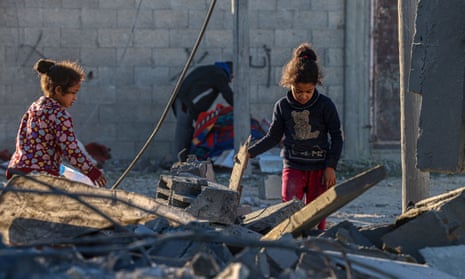
Israel shut off water supplies and blocked most food, fuel and medical aid to the territory after the deadly Hamas attack of 7 October.
At the same time it launched an unprecedented bombing and ground assault that has so far killed about 24,000 Palestinians and wounded tens of thousands more, the majority women and children. Thousands more Palestinians are believed to be buried under the rubble of bombed buildings.
“The massive death, destruction, displacement, hunger, loss, and grief of the last 100 days are staining our shared humanity,” Lazzarini said. People were now living in “inhumane conditions”, he said, and diseases were spreading as Gazans “live through the unlivable”. He continued:
The plight of children in Gaza is especially heartbreaking. An entire generation of children is traumatized and will take years to heal. Thousands have been killed, maimed, and orphaned. Hundreds of thousands are deprived of education. Their future is in jeopardy, with far-reaching and long-lasting consequences.
Netanyahu suggests Israel would ignore court ruling ordering Gaza ceasefire
Israel will pursue its war against Hamas until victory and will not be stopped by anyone, including the world court, the prime minister, Benjamin Netanyahu, has said in a defiant speech on Saturday, as the fighting in Gaza approached the 100-day mark.
Netanyahu spoke after the international court of justice at The Hague held two days of hearings on South Africa’s allegations that Israel is committing genocide against Palestinians, a charge Israel has rejected as libelous and hypocritical, the Associated Press reported.
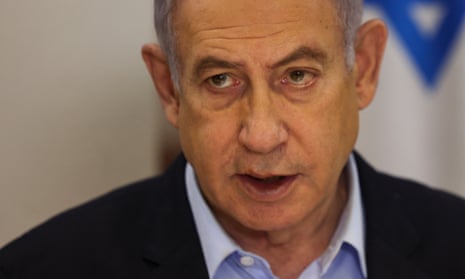
South Africa asked the court to order Israel to halt its blistering air and ground offensive in an interim step.
“No one will stop us, not The Hague, not the axis of evil and not anyone else,” Netanyahu said in televised remarks on Saturday evening, referring to Iran and its allied militias.
The case before the world court is expected to go on for years, but a ruling on interim steps could come within weeks. Court rulings are binding but difficult to enforce. Netanyahu made clear that Israel would ignore orders to halt the fighting, potentially deepening its isolation.
Israel has been under growing international pressure to end the war, which has killed more than 23,000 Palestinians in Gaza and led to widespread suffering in the besieged enclave, but has so far been shielded by US diplomatic and military support.
Opening summary
Hello and welcome to the Guardian’s live coverage of the Middle East crisis with me, Helen Livingstone.
Prime minister Benjamin Netanyahu has insisted that “no one will stop” Israel in its war against Hamas, including the international court of justice in The Hague, where South Africa this week launched a case against Israel accusing it of genocide.
“It is possible and necessary to continue until victory and we will do it,” Netanyahu said at a televised press conference, saying most Hamas battalions in Gaza had been “eliminated”.
The head of the UN agency for Palestinian refugees, Philippe Lazzarini, meanwhile warned that the clock is “ticking fast towards famine” in the Gaza strip, to where Israel has blocked water supplies and the delivery of most food, fuel and medical aid amid its brutal assault.
“The massive death, destruction, displacement, hunger, loss, and grief of the last 100 days are staining our shared humanity,” the UNRWA boss said in a statement late Saturday, the eve of the 100th day of Israel’s war on Gaza.
More on that soon. In other developments:
-
Thousands of demonstrators gathered in Washington DC on Saturday calling for a ceasefire in Gaza, where Israeli forces have killed nearly 24,000 Palestinians since 7 October. Pictures posted online showed demonstrators holding various signs including some saying “Stop funding apartheid now” and “Free Palestine”. Guest speakers who condemned Israel’s attacks on Gaza and urged for a ceasefire in Gaza included Cornel West, Imam Omar Suleiman and Wael al-Dahdouh (who spoke via a video feed).
-
Palestinian journalist Wael al-Dahdouh, who works for Al Jazeera and whose family members were killed by two separate Israeli strikes while he also was recently wounded by another Israeli strike himself, addressed the protest in Washington DC via a video feed from Gaza. He spoke up about the dire conditions in which Palestinians are struggling to exist in Gaza while under Israeli bombardment. “The people are paying an exorbitant price, and are living a disastrous life,” he told the crowds in Washington DC.
-
A Hamas official thanked Qatar on Saturday for sending medicine to Gaza “in light of the many risks that threaten the lives of Palestinians”, Reuters reports. Speaking at a news conference in Beirut, the Lebanon-based Hamas leader Osama Hamdan said: “Some medicine will be used to treat Israeli prisoners.”
-
The first lady of Namibia, Monica Geingos, has spoken out against Germany’s defense of Israel in South Africa’s case against Israeli genocide in Gaza at the International Court of Justice. In a statement on X, Geingos cited the Herero-Nama genocide, which was waged by German forces from 1904 to 1908 and killed between 24,000 and 100,000 Hereros and 10,000 Nama in Namibia (then known colonially as German South West Africa). Geingos said: “The absurdity of Germany, on 12 January 2024, rejecting genocide charges against Israel and warning about the ‘political instrumentalisation of the charge’ is not lost on us.”
-
The Committee to Protect Journalists has renewed its calls for the protection of journalists in Gaza and urged for “the killings of journalists by the Israeli army” to stop. CPJ’s Middle East and North Africa program coordinator, Sherif Mansour, said: “After 100 days of fighting, Israel’s longstanding record of impunity in journalist killings must face public scrutiny by allowing international media and international investigators uncensored access to Gaza. The killings of journalists by the Israeli army must stop now.”

